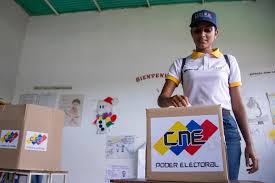
Low Voter Turnout in Venezuela Amid Boycott Calls and Repression Fears

 :
| Updated On: 27-May-2025 @ 12:26 pm
:
| Updated On: 27-May-2025 @ 12:26 pmSHARE
Venezuelans participated in legislative and regional elections marked by notably low voter turnout, driven by widespread disillusionment, frustration, and fears of government repression amid calls for a boycott from opposition leaders. These elections, held on Sunday, were the first to allow broad voter participation since last year’s contested presidential election, which President Nicolás Maduro declared himself the winner despite widespread evidence to the contrary.
The voting took place just two days after the government detained dozens of individuals, including a prominent opposition leader, accusing them of involvement in an alleged plot to disrupt the elections. Throughout the day, military personnel outnumbered voters at many polling stations in the capital, Caracas. Unlike the large crowds that gathered for the July 28 presidential election, polling stations this time saw little to no queues, signaling significant voter apathy and distrust.
Many Venezuelans have lost faith in the electoral process. For example, Paula Aranguren, a resident of Caracas, expressed her refusal to vote, citing the theft of last year’s elections and her reluctance to face disappointment again. The opposition views voter participation as a legitimization of Maduro’s contested power and his government’s repressive mechanisms.
Following the presidential elections, reports indicate that 25 people were killed and over 2,000 detained—including protesters, poll workers, political activists, and minors—as part of a crackdown on dissent. The government also issued arrest warrants against several opposition leaders on charges ranging from conspiracy to falsification of records, intensifying political repression.
Despite the risks, some opposition figures continue campaigning, viewing voting as a vital form of peaceful resistance. Henrique Capriles, a former opposition presidential candidate now running for a legislative seat, told Al Jazeera that voting remains an important democratic tool and a way to peacefully oppose Maduro’s regime. He emphasized that last year’s efforts kept alive the fight for constitutional rights through nonviolent means.
Meanwhile, the ruling United Socialist Party of Venezuela (PSUV) claimed an overwhelming victory nationwide, a pattern consistent with past regional elections. However, a nationwide poll by the research firm Delphos found that only 15.9% of voters were highly likely to participate in the election. Among those, 74.2% supported the ruling party candidates, while 13.8% backed opposition contenders not participating in the boycott.
President Maduro accused the opposition of trying to destabilize the country, alleging that fascist forces attempted to introduce mercenaries to carry out bombings and violent attacks. He claimed security forces had already arrested over 50 such mercenaries prior to the election day.
Political analysts are skeptical about the elections’ fairness. Benigno Alarcon, a political analyst, noted the near absence of election witnesses, low voter turnout, lack of clarity about candidates, and absence of international observers, all of which undermine the credibility of the process.
Some voters admitted that fear motivated their participation, concerned about losing government jobs or state-controlled benefits such as food subsidies. Miguel Otero, a 69-year-old state employee, told the Associated Press that while many of his friends refused to vote—even to cast a blank ballot—he felt compelled to comply and had to provide proof of voting to keep his job.
In sum, the elections reflected deep political polarization, erosion of public trust, and ongoing repression, raising serious questions about the legitimacy and fairness of Venezuela’s electoral system amid a broader crisis.
Contact Us
House. No. : 163, Second Floor Haridev Rd, near Puberun Path, Hatigaon,Guwahati, Assam 781038.
E-mail : assaminkcontact@gmail.com
Contact : +91 8811887662
Enquiry
×
Reporter Login
×